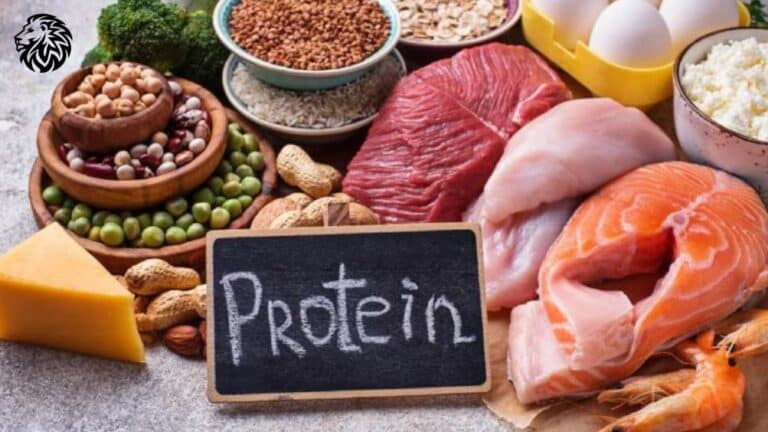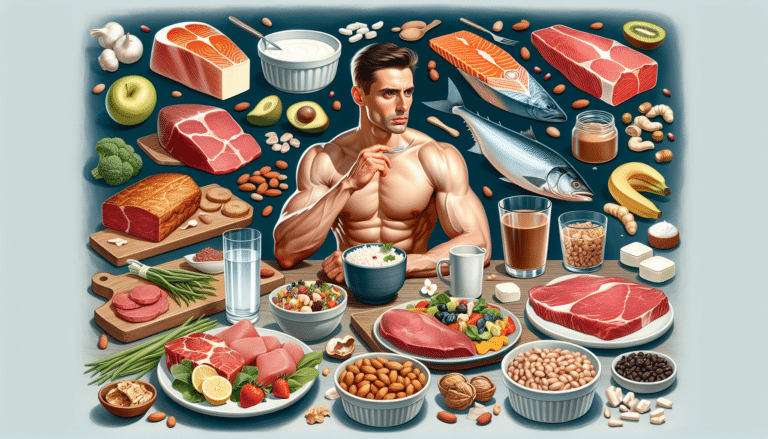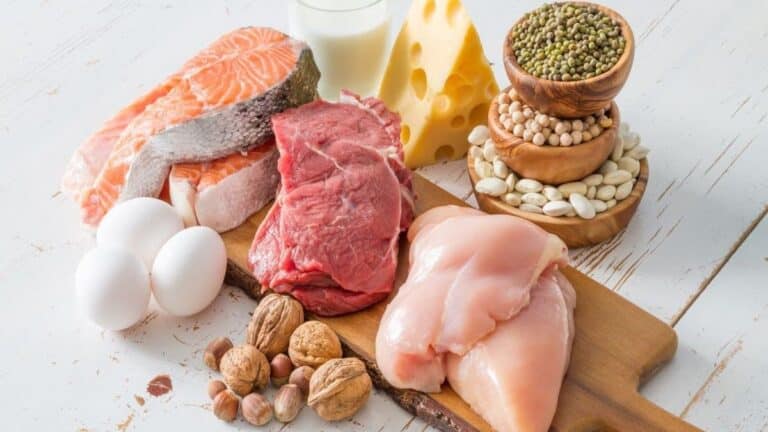In an era where health-consciousness is on the rise, deciphering the elements that impact metabolism has become exceedingly crucial. Of these factors, protein stands out as a vital component in enhancing metabolism. Far beyond its role as a macronutrient crucial for tissue building and repair, protein also optimizes body composition and bolsters overall health. Within this in-depth article, we shall dissect the science propelling protein’s power in boosting metabolism and explore the myriad benefits associated with protein-rich diets.
The Science Behind Protein and Metabolism
The Role of Protein in Metabolism
Thermic effect of food: Our bodies expend energy to digest, absorb, and metabolize nutrients—a process known as the thermic effect of food (TEF). Remarkably, protein surpasses carbohydrates and fats in TEF, causing our bodies to burn additional calories during protein digestion and absorption. This heightened energy expenditure enhances metabolism overall, positioning protein as a linchpin in weight management and metabolic health.
Amino acids and their role: As protein’s building blocks, amino acids are instrumental in diverse metabolic processes. They participate not only in synthesizing new proteins but also in creating enzymes, hormones, and other essential molecules for optimal metabolic function. Ensuring a proper balance of essential amino acids derived from dietary protein sources facilitates these metabolic processes efficiently, thereby fostering a healthy metabolism.
Muscle maintenance and growth: Metabolically active muscle tissue demands energy to sustain and develop. Proteins supply the necessary amino acids for muscle repair and growth, helping to maintain or elevate lean body mass. Consequently, a higher lean body mass results in an increased basal metabolic rate (BMR)—the number of calories burned at rest. Thus, protein consumption indirectly elevates metabolism by supporting muscle maintenance and growth.
The Importance of Protein Quality
Complete vs. incomplete proteins: Complete proteins boast all nine essential amino acids in ample quantities, while incomplete proteins lack one or more of these critical amino acids. To ensure optimal metabolic function, it is vital to consume complete proteins or combinations of incomplete proteins that offer a full spectrum of amino acids. Generally, animal-based proteins are complete, whereas plant-based proteins tend to be incomplete. However, a thoughtfully planned plant-based diet can still provide all essential amino acids through diverse protein sources.
Protein digestibility: The efficiency with which our bodies break down and absorb amino acids from dietary protein sources is known as protein digestibility. Highly digestible, high-quality protein sources ensure that amino acids are readily available for various metabolic processes. Although animal-based proteins usually exhibit higher digestibility than plant-based proteins, specific plant sources, such as soy and quinoa, also boast high digestibility.
Biological value: A protein’s biological value (BV) gauges its capacity to provide the essential amino acids needed for growth and maintenance. Proteins with higher BVs are more effectively utilized by the body, contributing to superior metabolic function. Animal-based proteins generally possess a higher BV than plant-based proteins, but a diet incorporating diverse protein sources can still supply all necessary amino acids for optimal metabolism.

Benefits of a Protein-Rich Diet
Enhanced Weight Loss and Body Composition
Satiety and hunger control: Protein-rich foods tend to promote greater satiety than carbohydrates and fats, helping to control hunger and reduce overall calorie intake. The increased feeling of fullness can lead to a more sustainable weight loss journey and improved body composition over time.
Increased calorie expenditure: As previously mentioned, the thermic effect of food (TEF) is higher for protein than other macronutrients, meaning that more calories are expended during the digestion and absorption of protein. This increased calorie expenditure contributes to a higher daily energy expenditure, which can aid in weight loss and improved body composition.
Prevention of muscle loss during weight loss: When losing weight, it is essential to maintain lean body mass to prevent a decrease in metabolic rate. Consuming adequate protein can help preserve muscle tissue during periods of caloric restriction, ensuring that weight loss primarily comes from fat loss rather than muscle loss.
Improved Athletic Performance
Muscle repair and growth: Adequate protein intake is essential for athletes as it provides the necessary amino acids for muscle repair and growth. Consuming sufficient protein in conjunction with resistance training can lead to increased muscle mass, strength, and performance.
Enhanced endurance and strength: Protein consumption not only supports muscle growth but also contributes to improved muscle function. Proper protein intake can lead to enhanced endurance and strength, allowing athletes to perform at their best.
Optimized recovery: Following exercise, the body requires protein to repair muscle damage and promote recovery. Consuming protein-rich foods or supplements after a workout can help accelerate recovery, reduce muscle soreness, and prepare the body for subsequent training sessions.
Overall Health and Well-being
Hormonal balance: Protein plays a crucial role in the synthesis of various hormones, including insulin, growth hormone, and thyroid hormones. These hormones are essential for regulating metabolism, growth, and overall health. Consuming an adequate amount of protein can help maintain hormonal balance and support optimal well-being.
Immune function: Amino acids from protein are required for the synthesis of antibodies, which are essential for a healthy immune response. Consuming sufficient protein can help support a robust immune system, reducing the risk of illness and promoting overall health.
Cognitive health: Protein is involved in the synthesis of neurotransmitters, which are essential for proper brain function and cognitive health. Consuming an adequate amount of protein can help support mental clarity, focus, and overall cognitive function.

Incorporating Protein into Your Diet
Choosing High-Quality Protein Sources
Animal-based proteins: Animal-derived protein sources, such as lean meats, poultry, fish, eggs, and dairy products, are complete proteins that provide all the essential amino acids required for optimal metabolic function. Select lean cuts of meat and low-fat dairy options to ensure a balance of protein, healthy fats, and other essential nutrients.
Plant-based proteins: Although many plant-based protein sources are incomplete, they can still contribute significantly to your daily protein intake. Legumes, nuts, seeds, whole grains, and soy products like tofu and tempeh are excellent sources of plant-based protein. By consuming a variety of plant-based proteins, you can ensure a complete profile of essential amino acids.
Blending protein sources for optimal benefits: Combining different protein sources can provide a comprehensive spectrum of essential amino acids and other nutrients. Including both animal and plant-based protein options in your diet can help optimize overall health and metabolic function.
Meal Planning and Protein Timing
Protein distribution throughout the day: Consuming protein in a balanced manner throughout the day can help maintain stable blood sugar levels and prevent energy crashes. Aim to include a source of high-quality protein in each meal and snack to ensure consistent protein intake and support optimal metabolism.
Pre- and post-workout protein consumption: Consuming protein before and after exercise can help support muscle repair, growth, and recovery. A protein-rich snack or meal within 1-2 hours before exercise can provide the necessary amino acids for muscle function, while a post-workout protein source can aid in recovery and muscle synthesis.
Meeting individual protein needs: Protein requirements vary based on factors such as age, sex, activity level, and health status. It is crucial to assess your individual protein needs and plan your diet accordingly. Consult a registered dietitian or nutritionist to help determine your specific protein requirements and design a meal plan tailored to your unique needs.

Conclusion
The power of protein in boosting metabolism is undeniable, with research demonstrating its role in promoting weight loss, improving athletic performance, and supporting overall health. Incorporating high-quality protein sources into a well-balanced diet is essential for unlocking the full metabolic potential of this vital macronutrient. By understanding the science behind protein and metabolism, individuals can make informed choices to optimize their health and well-being.
Frequently Asked Questions
How does protein consumption affect metabolism?
Protein consumption affects metabolism through the thermic effect of food, increased muscle maintenance and growth, and the role of amino acids in various metabolic processes.
What are some high-quality protein sources to include in my diet?
High-quality protein sources include lean meats, poultry, fish, eggs, dairy, legumes, and certain plant-based options like quinoa, tofu, and tempeh.
How much protein should I consume daily to optimize my metabolism?
Daily protein needs vary based on factors like age, sex, activity level, and health status. Consult a registered dietitian or nutritionist to determine your individual protein needs.
Can too much protein intake harm my health?
Excessive protein intake can strain the kidneys, contribute to bone loss, and potentially harm heart health. It’s essential to consume an appropriate amount of protein for your individual needs.
Is it better to consume protein from animal or plant sources?
Both animal and plant-based proteins have unique benefits. Consuming a mix of protein sources can provide a balance of essential amino acids and other nutrients for optimal health.
References and Further Reading
- WebMD. (n.d.). High-Protein Diet: What It Is and How to Do It. Retrieved from https://www.webmd.com/diet/ss/slideshow-high-protein-diet
- Healthline. (n.d.). A High-Protein Diet Plan to Lose Weight and Improve Health. Retrieved from https://www.healthline.com/nutrition/high-protein-diet-plan
- Medical News Today. (n.d.). What to eat on a high-protein diet. Retrieved from https://www.medicalnewstoday.com/articles/321522
- Harvard Health Publishing. (n.d.). High-protein foods: The best protein sources to include in a healthy diet. Retrieved from https://www.health.harvard.edu/nutrition/high-protein-foods-the-best-protein-sources-to-include-in-a-healthy-diet
- Mayo Clinic. (n.d.). High-protein diets: Are they safe? Retrieved from https://www.mayoclinic.org/healthy-lifestyle/nutrition-and-healthy-eating/expert-answers/high-protein-diets/faq-20058207







